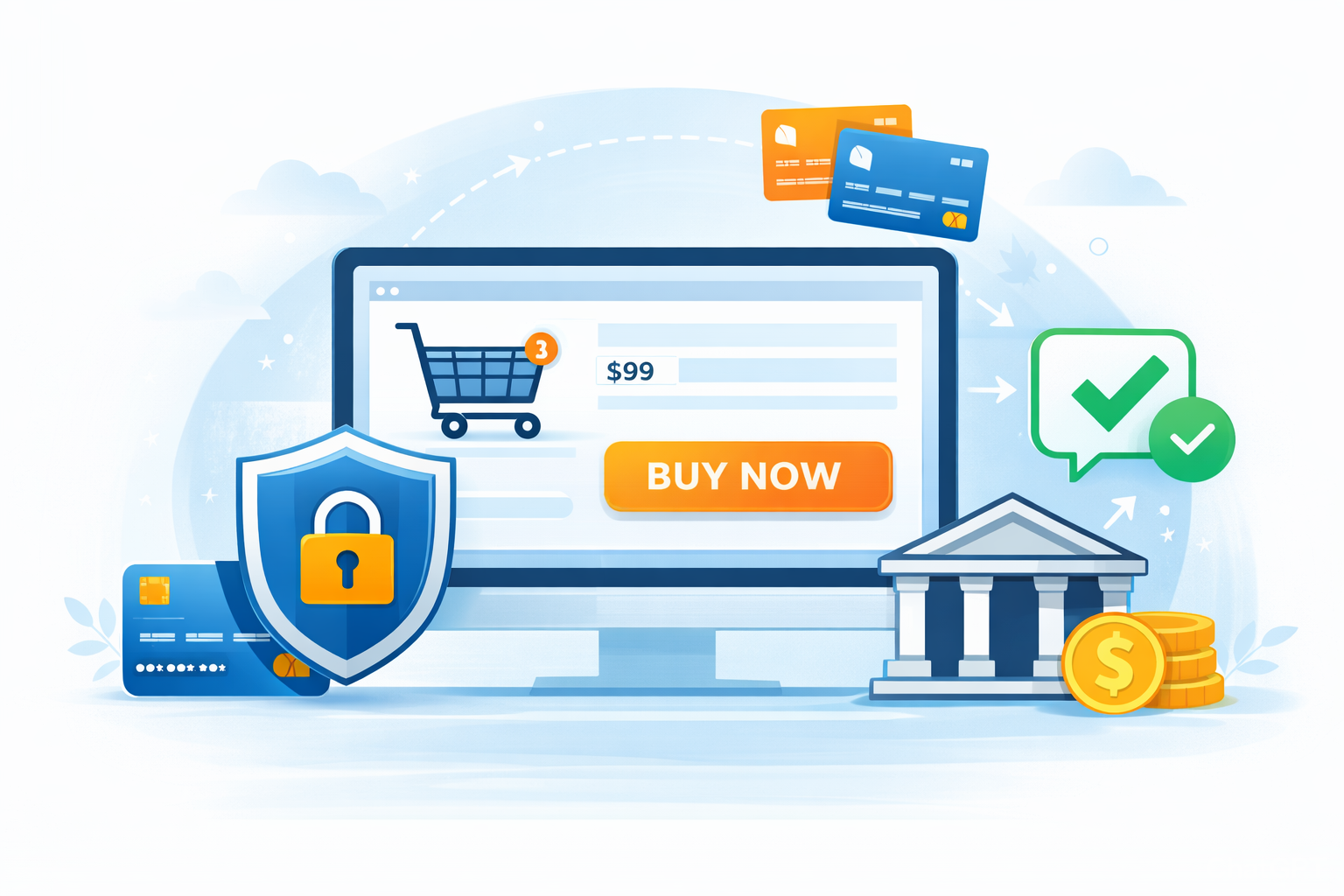Try Zipchat in Action!
Enter your store URL to see how Zipchat would behave.

In today's digital age, having a strong online presence is crucial for any business looking to thrive. And when it comes to e-commerce platforms, Shopify has emerged as a popular choice for entrepreneurs. With its user-friendly interface and robust features, it provides a solid foundation for setting up and running an online store. However, simply having a Shopify store isn't enough to guarantee success. To truly unlock its full potential, you need to implement effective SEO strategies. In this article, we will dive into the world of SEO for Shopify and explore how you can use it to grow your sales.
Understanding the Importance of SEO for Shopify
Before we delve into the nitty-gritty of SEO strategies, let's first understand why SEO is crucial for your Shopify store. SEO, or Search Engine Optimization, is the process of optimizing your website to improve its visibility on search engine results pages (SERPs). In today's competitive online landscape, ranking well on search engines like Google can make or break your online business. Studies have shown that the majority of online experiences start with a search engine, making it essential to appear in the top search results for relevant keywords.
Furthermore, SEO is not just about increasing visibility; it's also about enhancing user experience. By optimizing your site's structure, content, and performance, you can provide visitors with a seamless browsing experience, leading to higher engagement and conversion rates. This user-centric approach to SEO can help build trust with your audience and establish your Shopify store as a reputable source in your industry.
The Role of SEO in E-commerce
E-commerce has exploded in recent years, with more and more consumers turning to online shopping for their needs. As an e-commerce store owner, your ultimate goal is to drive traffic and convert visitors into paying customers. This is where SEO plays a vital role. By optimizing your Shopify store for search engines, you can attract targeted organic traffic, increase your visibility, and ultimately boost sales.
Moreover, SEO in e-commerce goes beyond just keyword optimization. It also involves optimizing product pages, improving site speed, implementing structured data markup, and building high-quality backlinks. These multifaceted SEO strategies can help your Shopify store rank higher in search results, drive qualified leads, and outperform competitors in the competitive online marketplace.
Why Shopify Needs SEO
While Shopify provides a solid foundation for your online store, it's important to remember that it's just a platform. Without effective SEO, your store may get lost in the sea of competitors. By implementing SEO strategies, you can ensure that your store stands out in search engine results and attracts potential customers who are actively searching for your products.
Additionally, SEO for Shopify is an ongoing process that requires constant monitoring and optimization. Search engine algorithms are constantly evolving, and staying ahead of the curve is essential to maintain your store's visibility and relevance. By staying informed about the latest SEO trends, conducting regular audits, and adapting your strategies accordingly, you can position your Shopify store for long-term success in the ever-changing digital landscape.
Fundamentals of SEO for Shopify
Now that we understand the importance of SEO for your Shopify store, let's explore some fundamental strategies that can help you get started on the right foot.

Keyword Research for Your Shopify Store
Keyword research forms the foundation of any successful SEO strategy. By identifying relevant keywords that your target audience is searching for, you can optimize your content and product pages to match their intent. Start by brainstorming a list of keywords that are relevant to your products or services. Utilize keyword research tools, such as Google Keyword Planner or SEMrush, to expand your list and find valuable keywords with high search volume and low competition.
But keyword research doesn't stop at just finding the right words. It's important to understand the context behind those keywords. What are the pain points or desires of your target audience that these keywords address? By diving deeper into the psychology of your customers, you can create content that truly resonates with them and drives organic traffic to your Shopify store.
On-Page SEO Techniques for Shopify
On-page SEO involves optimizing the elements on your website to make it more search engine friendly. One of the key on-page SEO techniques for Shopify is optimizing your product pages. Ensure that each product page has a unique and keyword-rich meta title and description. Incorporate relevant keywords in the product title and description, but make sure it reads naturally and provides value to the users. Additionally, optimize your product images by using descriptive file names and alt tags.
But on-page SEO is not just about keywords and meta tags. It's about creating a seamless user experience. Make sure your website is easy to navigate, with clear and intuitive menus. Provide detailed product descriptions that answer all potential questions your customers may have. And don't forget about the importance of page load speed – a fast-loading website not only improves user experience but also boosts your search engine rankings.
Off-Page SEO Techniques for Shopify
Off-page SEO refers to the actions taken outside of your website to improve its visibility and authority. One of the most effective off-page SEO techniques is building high-quality backlinks. Reach out to relevant industry blogs and websites to secure guest posting opportunities or product reviews. This not only helps in improving your website's authority but also drives targeted traffic to your Shopify store.
However, off-page SEO is not just about backlinks. It's about building a strong online presence and reputation. Engage with your target audience on social media platforms, join relevant online communities, and participate in industry events. By establishing yourself as an authority in your niche, you not only attract more organic traffic but also gain the trust and loyalty of your customers.
Optimizing Your Shopify Store for SEO
Now that you have a solid understanding of the fundamental SEO techniques, it's time to optimize your Shopify store for maximum visibility.

When it comes to optimizing your Shopify store for SEO, there are several key strategies you can implement to boost your online presence and attract more organic traffic. In addition to the fundamental techniques you've already learned, diving deeper into specific aspects of your website can make a significant impact on your search engine rankings.
Improving Shopify Site Structure
A well-structured website not only enhances user experience but also makes it easier for search engines to crawl and index your content. Ensure that your navigation is clear and intuitive, allowing users to easily find what they're looking for. Break down your products into relevant categories and subcategories, and optimize the URLs to include descriptive keywords.
Furthermore, consider implementing breadcrumb navigation on your site to provide users and search engines with a clear path to navigate through your store. Breadcrumbs not only improve user experience by showing visitors their current location on your site but also help search engines understand the hierarchy of your content, potentially boosting your SEO efforts.
Enhancing Product Descriptions and Images
Quality product descriptions and images are essential for converting visitors into customers. Craft compelling and unique product descriptions that highlight the key features and benefits. Use high-quality images that accurately represent the product. Optimize the image file names and alt tags to include relevant keywords for better search engine visibility.
Consider incorporating user-generated content such as reviews and testimonials on your product pages. Not only does this provide valuable information to potential customers, but it also adds fresh, unique content to your site that can improve your SEO performance. Encouraging customers to leave reviews and share their experiences can help build trust and credibility for your brand.
Utilizing SEO-Friendly URLs
Incorporating SEO-friendly URLs can have a significant impact on your search engine rankings. By including relevant keywords in your URLs, you provide search engines with valuable context about the content of your pages. Ensure that your URLs are concise, descriptive, and easy to read.
Additionally, consider implementing canonical tags on your product pages to avoid duplicate content issues that can harm your SEO efforts. Canonical tags signal to search engines the preferred version of a web page, consolidating link equity and preventing potential indexing problems. By proactively managing your URLs and canonical tags, you can streamline the crawling and indexing process for search engines, ultimately improving your site's overall SEO performance.
Leveraging Shopify SEO Tools and Apps
Shopify offers a variety of SEO tools and apps that can help streamline your optimization efforts.
When delving into the world of e-commerce, having a strong SEO strategy is crucial for driving organic traffic to your online store. Shopify understands this need and equips its users with a range of powerful SEO tools and apps to enhance their digital presence.
Overview of Shopify SEO Tools
Shopify provides built-in SEO features, such as customizable title tags, meta descriptions, and URL structures. These tools make it easier for you to optimize your store without the need for extensive technical knowledge. Additionally, Shopify offers integrations with popular SEO apps, providing you with advanced features and functionalities.
Customizable title tags and meta descriptions are essential components of on-page SEO. By tailoring these elements to accurately reflect the content of each page on your Shopify store, you can improve your chances of ranking higher in search engine results pages (SERPs). Furthermore, optimizing your URL structures to be concise and descriptive can also contribute to better visibility and click-through rates.
How to Use Shopify SEO Apps Effectively
Shopify SEO apps, such as Plug in SEO or SEO Manager, can help automate and simplify your SEO tasks. These apps offer features such as automated meta tags, image optimization, and XML sitemap generation. Take advantage of these apps to save time and ensure that your store stays optimized consistently.
Automated meta tags provided by SEO apps can dynamically generate meta titles and descriptions based on your product information, saving you the manual effort of individually crafting them for each item. Image optimization features help in reducing load times and improving user experience, while XML sitemaps aid search engine crawlers in efficiently indexing your site's content.
Enhancing SEO with Zipchat AI
Integrating Zipchat AI into your Shopify store can significantly improve your SEO efforts. One of the primary advantages of using Zipchat AI is that it increases the amount of time visitors spend on your website. When customers engage in conversations with Zipchat AI, they are likely to stay longer, which signals to search engines like Google and Bing that your site content is engaging and valuable. This extended engagement can lead to higher search rankings, making your store more visible to potential customers.
Furthermore, Zipchat AI helps reduce bounce rates by offering personalized product and content recommendations during interactions. When visitors receive tailored suggestions, they are more inclined to explore additional pages on your site. This behavior indicates to search engines that your website provides high-quality content and a great user experience, further enhancing your SEO performance.
By incorporating Zipchat AI, you not only enhance customer interaction but also leverage its capabilities to boost your website's SEO. Don't miss the chance to elevate your Shopify store's success. Start your 7-Day Free Trial today and experience the transformative power of Zipchat AI.
Monitoring and Improving Your Shopify SEO Performance
SEO is an ongoing process, and it's crucial to monitor and improve your performance regularly. By staying proactive and vigilant in your SEO efforts, you can ensure that your Shopify store remains competitive and visible in search engine results.
Tracking SEO Results with Analytics
With Google Analytics, you can gain valuable insights into your website's performance. Track important SEO metrics, such as organic traffic, conversion rates, and bounce rates. Analyze the data to identify areas for improvement and make data-driven decisions to enhance your SEO strategy. By delving deep into your analytics data, you can uncover patterns and trends that can guide your SEO optimization efforts, leading to increased visibility and traffic for your Shopify store.
Regular SEO Audits for Your Shopify Store
Performing regular SEO audits allows you to identify and address any potential issues that may be affecting your search engine visibility. Audit your website for technical errors, broken links, duplicate content, and other SEO-related issues. Make the necessary adjustments to ensure that your Shopify store is in top shape for optimal search engine rankings. By conducting thorough audits, you can maintain a well-optimized website that is favored by search engines, ultimately improving your online presence and driving more organic traffic to your store.
Adapting SEO Strategies for Changing Trends
SEO is a dynamic field, with algorithms and trends constantly evolving. Stay updated with the latest SEO trends and adapt your strategies accordingly. Keep an eye on emerging keywords, changes in search engine algorithms, and industry shifts that may impact your SEO efforts. By remaining agile and responsive to changing trends, you can position your Shopify store for long-term success in the competitive online landscape. Continuously refining and adapting your SEO strategies will help you stay ahead of the curve and maintain a strong foothold in search engine rankings.
Concluding Thoughts on SEO for Shopify
Implementing effective SEO strategies is key to growing your sales on Shopify. By understanding the importance of SEO, mastering the fundamentals, optimizing your store, leveraging SEO tools, and monitoring your performance, you can improve your visibility, attract targeted traffic, and ultimately increase your sales on Shopify.

Key Takeaways for Successful Shopify SEO
- SEO is crucial for improving the visibility of your Shopify store on search engines.
- Keyword research, on-page optimization, and off-page strategies form the foundation of successful SEO.
- Optimize your Shopify store by improving site structure, enhancing product descriptions and images, and utilizing SEO-friendly URLs.
- Leverage Shopify's built-in SEO tools and apps to streamline your optimization efforts.
- Regularly monitor your SEO performance using analytics and perform SEO audits to identify areas for improvement.
- Stay updated with the latest SEO trends and adapt your strategies to stay ahead of the competition.
Future Outlook on SEO and E-commerce
The world of SEO is continually evolving, and it's important to stay ahead of the curve. As e-commerce continues to grow, the significance of SEO in driving online sales will only increase. By staying informed, embracing new techniques, and prioritizing your Shopify store's SEO efforts, you can secure a prosperous future for your online business.
Looking ahead, one exciting trend in SEO is the rise of voice search. With the increasing popularity of virtual assistants like Siri, Alexa, and Google Assistant, more and more people are using voice commands to search for products and services online. This means that optimizing your Shopify store for voice search is becoming increasingly important.
When it comes to voice search, long-tail keywords are crucial. People tend to use more conversational and natural language when speaking compared to typing, so it's essential to incorporate these long-tail keywords in your product descriptions, blog posts, and other content on your Shopify store. Additionally, optimizing your site for local SEO can also be beneficial for voice search, as people often use voice commands to find nearby businesses or products.
Another emerging trend in SEO for e-commerce is the integration of social media. Social media platforms like Instagram, Facebook, and Pinterest are not only great for promoting your products but also for boosting your SEO efforts. By regularly sharing high-quality content, engaging with your audience, and using relevant hashtags, you can increase your brand's visibility and drive more traffic to your Shopify store.
Furthermore, user-generated content is becoming increasingly influential in SEO. Encouraging your customers to leave reviews, testimonials, and share their experiences with your products can not only build trust but also improve your search engine rankings. Search engines value fresh and unique content, and user-generated content provides just that.
In conclusion, while mastering the fundamentals of SEO and optimizing your Shopify store are essential, it's equally important to stay updated with the latest trends and techniques. By embracing voice search optimization, leveraging social media, and encouraging user-generated content, you can stay ahead of the competition and ensure the long-term success of your online business.
Take Your Shopify Sales to the Next Level with Zipchat AI
Now that you're equipped with the knowledge to boost your Shopify store's SEO and stay ahead of e-commerce trends, it's time to amplify your results with Zipchat AI. As the most powerful AI Chatbot for Ecommerce, Zipchat AI is designed to proactively engage your store visitors, helping you sell more products while providing exceptional customer support. Experience the transformative power of a chatbot that can skyrocket your conversion rates, with merchants witnessing an impressive 13.4% Chat-to-Sale rate on average. Don't miss out on this opportunity to elevate your online store. Start a 7-Day Free Trial today and watch your sales soar!








